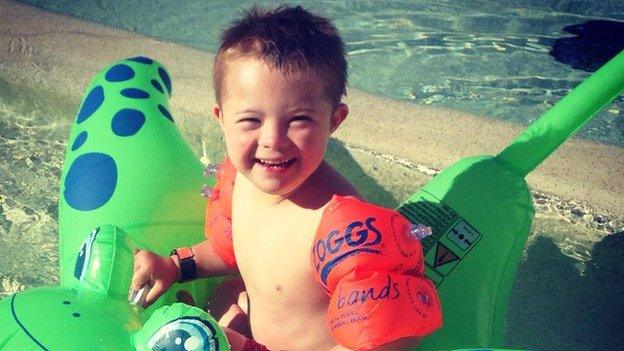The struggle to find work when you have Down's syndrome
- Published
- comments
James Hamilton tells Victoria Derbyshire of his difficulty in finding paid employment
Fewer than two in 10 people with learning disabilities are in employment. For people with Down's syndrome, it can leave them demoralised - but are things changing?
"I have a friend with [Down's syndrome] who actually pays someone £40 just so they can do his gardening [for him]," says Kate Brackley.
Ms Brackley is one of around 40,000 people living with Down's syndrome in the UK. Unlike many others, she is in paid employment.
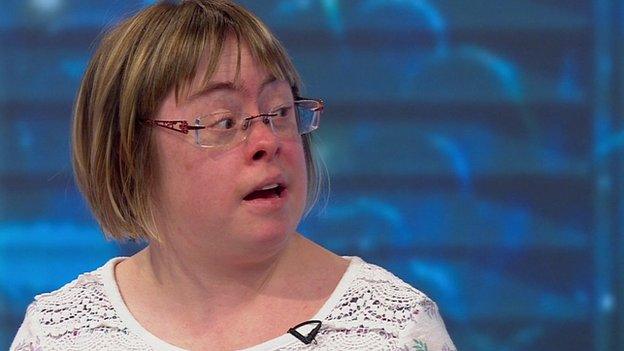
Sara Pickard says employers do not understand how capable people with Down's syndrome can be
Research from the charity Mencap suggests 65% of people with learning disabilities - including, though not limited to, Down's syndrome - want to work, but fewer than 20% of those of working age are currently in employment.
Some are desperate to gain experience of work - though the story of Ms Brackley's friend is not a practice Mencap had previously come across.
Conventional voluntary work, however, is an avenue many people with the condition explore.
Sara Pickard - who also has Down's syndrome - says volunteering can be a way to demonstrate skills that could be used in the workplace.
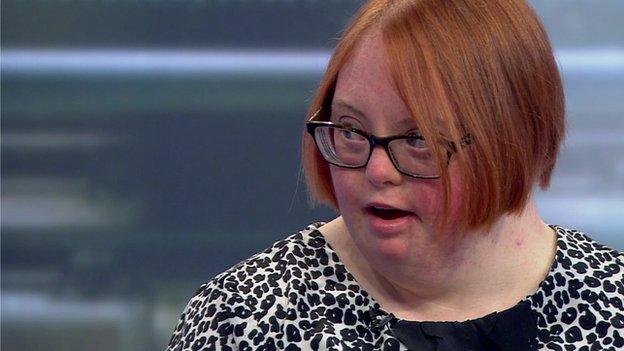
Kate Brackley says becoming employed made her feel "worthwhile"
Ms Pickard has been working for the charity Mencap Cymru for nine years, and often visits employers as part of her role.
She believes "the big bosses don't always necessarily know what people with learning disabilities are capable of doing."
"We try and show them this is what people with a learning disability can do, and this is how easy it is for them to get them in things like employment," she says.
Just meeting her, she says, can help to change people's perception. "They see that if I can do it, others can."
She believes there is a general "ignorance" in society towards people with learning difficulties, of which the views of employers may be a product.
"The public don't know about Down's syndrome," she explains, adding that some people even seem scared of those with the condition.
"They're seeing someone who is different and [project] their own stereotypical view," she adds.

Down's syndrome
Down's syndrome is a genetic condition, resulting from an additional copy of chromosome 21.
Approximately one in every 1,000 babies in the UK is born with Down's syndrome.
The average life expectancy for a person with the condition is around 60.
People with Down's syndrome experience learning difficulties to different degrees, while the condition can also lead to a greater risk of early-onset dementia, blood disorders and heart defects.
Source: Down Syndrome Research Foundation

For others, the greatest obstacle to finding a job is self belief. "Some people with Down's syndrome may want to work, but may feel self aware [about whether] they can hold down a job," Ms Pickard says.
Previous experiences can feed into this. Ms Brackley - who works for the British Institute of Learning Difficulties - was the victim of disability hate crime while at school.
"It was horrible at the time," she recalls.
"Luckily I got the courage to speak out," she adds, saying being employed made her feel "worthwhile". She recognises though that many others will not react in the same way.
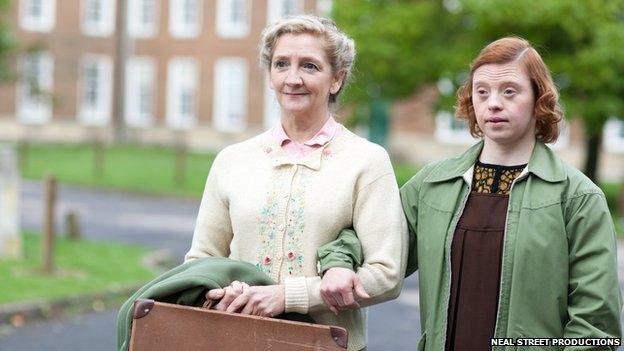
Sarah Gordy (right) is perhaps best known for her role as Sally Harper in Call The Midwife
Actress Sarah Gordy, best known for her role as Sally Harper in Call The Midwife, believes part of the problem is that people with Down's Syndrome are "badly labelled", which can be difficult to overcome.
"We're all scared of labels," she says.
She thinks awareness is the key: "It is really important that everybody... has the right to have work, to have an education. Everywhere, nationwide."
But there are signs of improvement. The charity Down's Syndrome Association launched its own initiative in 2012, called WorkFit, external, to improve understanding of the condition among employers.
Veronica Mulenga, employment development manager at the charity, says that some misconceptions still remain, but the situation is improving.
"Previously, employers never knew that people with Down's syndrome wanted to find work," she explains.
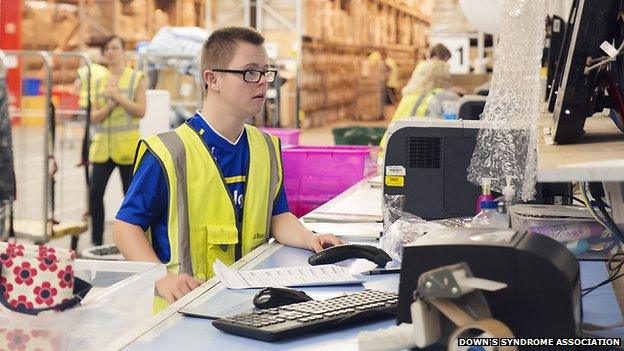
Employers are becoming more receptive to hiring people with Down's syndrome, the Down's syndrome Association says
"There was also no clear pathway for those seeking employment to find it. There were endless courses aimed at preparing people with learning difficulties for work, but they didn't lead anywhere."
She believes employers are now "more confident in hiring people with Down's syndrome. They want to involve them, be inclusive, have a diverse workforce."
Extended hours
The WorkFit programme has helped individuals not just to find work but to stay in employment, she adds. This was not always the case, she points out, as many employers felt unsupported and were unaware of how to best utilise staff.
The employers who have signed up to the scheme include big multi-national and independent companies across a range of sectors - from retail to healthcare.
Staff with Down's syndrome mostly work in structured roles that are process driven, in which Ms Mulenga says they "thrive".
She adds, with pride, that many of those who are employed are now receiving training to further their careers, and - while typically they begin by working four to eight hours a week - many have now been given extended hours.
The first woman she worked with, she explains, is now working 17 hours each week, "even though her close family thought the original three would be enough".
This is the sort of progress Sara Pickard is delighted to hear about. Her motto is slowly beginning to ring true with more and more employers: "Down's syndrome. So what?"
Watch Victoria Derbyshire weekdays from 09:15-11:00 BST on BBC Two and BBC News Channel. Follow the programme on Facebook, external and Twitter, external, and find all our content online.
- Published5 February 2015
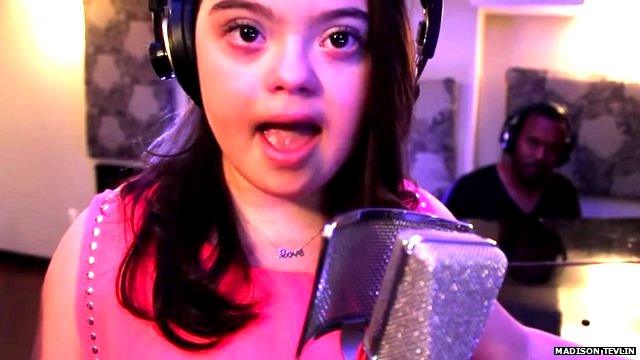
- Published1 April 2015

- Published13 August 2014
